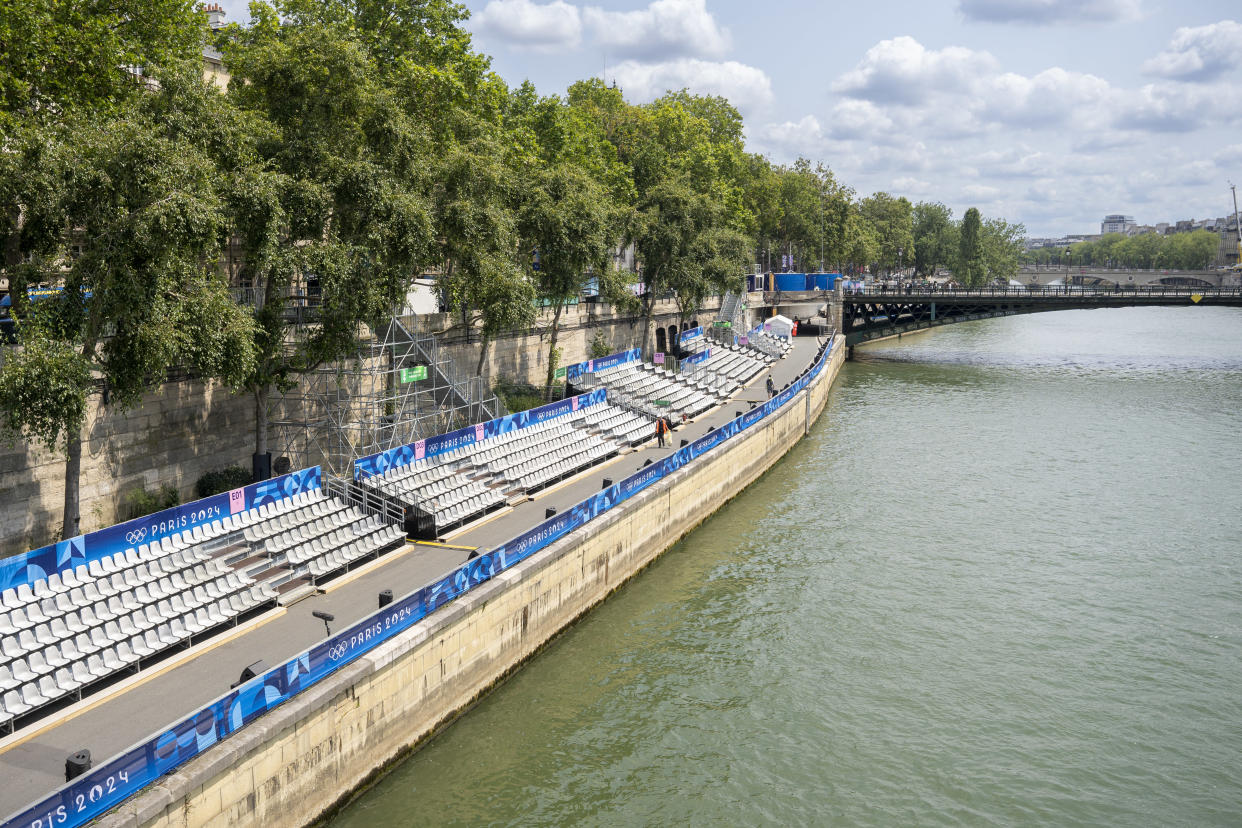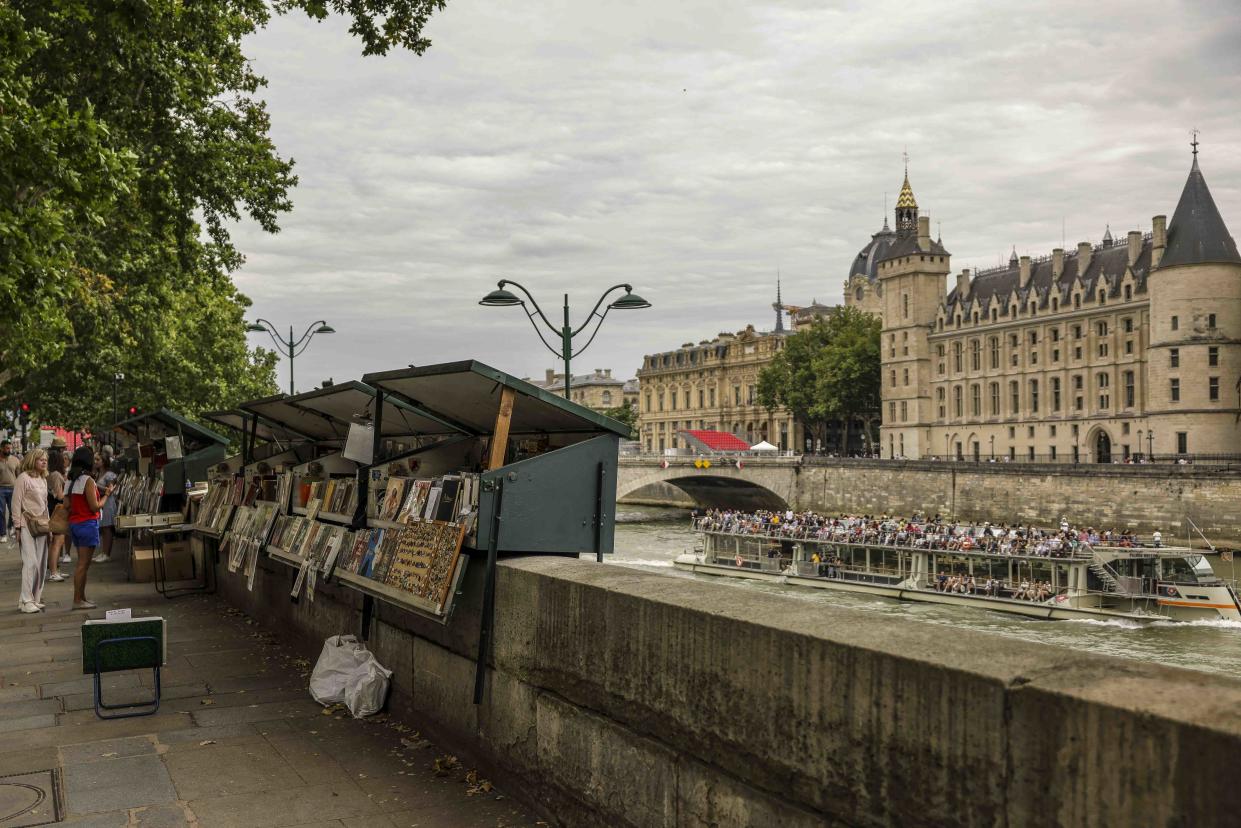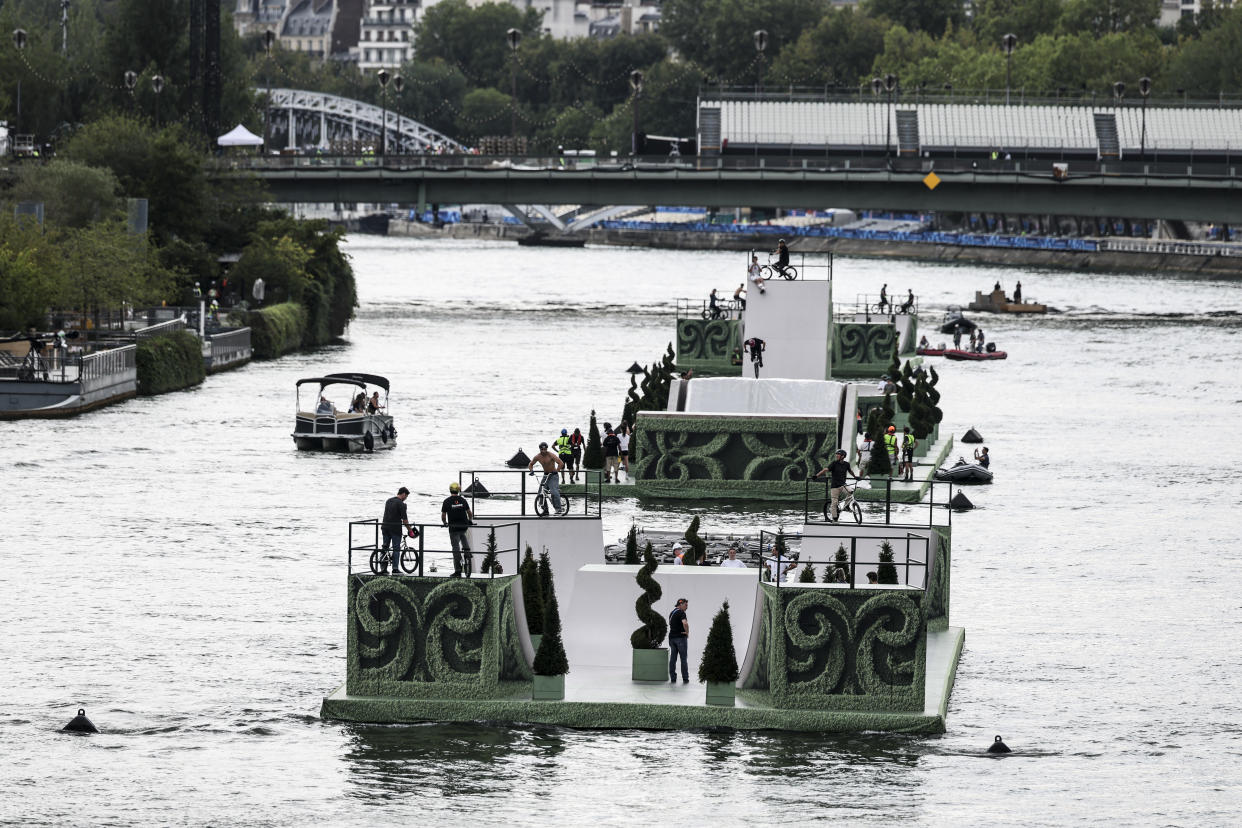2024 Olympics: Paris prepares for a spectacular, first-of-its-kind Opening Ceremony in the heart of the city
PARIS — The Olympic motto is “Citius, Altius, Fortius — Communiter,” which means “Faster, Higher, Stronger — Together.” That doesn’t just apply to the athletes competing in the Games; it’s an aspiration for the Olympics’ hosts as well. It’s not enough to provide venues for the Olympics; a host nation has to put on a world-class performance, too, starting with the biennial extravaganza that is the Opening Ceremony.
Throughout the Olympics’ history, opening ceremonies set the tone and tenor of the Games, combining lavish spectacle with national character to create instantly memorable (and, in the social media era, meme-worthy) moments. In recent years, opening ceremonies have served up awe-inspiring demonstrations of collective national willpower (China’s massive, thousands-strong 2008 performances), cheeky gags (James Bond and Queen Elizabeth skydiving at London 2012), cringe-inducing production mistakes (2014 Sochi’s unlit Olympic ring), misfired attempts at populism (Vancouver 2010’s torch relay featuring Wayne Gretzky in the back of a pickup truck), shocking and heartbreaking tugs of nostalgia (a visibly ill Muhammad Ali holding the torch at Atlanta 1996) and defiant exhibitions of political muscle (China again, in 2022, where Xi Jinping and Russia’s Vladimir Putin watched the Opening Ceremony together).
Paris Olympic organizers saw all those stadium-based ceremonies, and raised them to a citywide level. The 2024 Opening Ceremony will, in effect, transform an entire region of Paris into an enormous open-air stadium, parading thousands of athletes along the Seine River on hundreds of boats, before hundreds of thousands of onlookers, highlighting both the athletes and the spectacular City of Lights itself.
Whether you’re a hardcore all-Olympics, all-the-time viewer or an agnostic wondering why there’s so much swimming and gymnastics on your TV the next two weeks … you’re going to want to tune in for this one.

The Opening Ceremony’s parade of boats will begin at Pont D’Austerlitz, a bridge just east of Notre Dame Cathedral. Starting at 7:30 p.m. local time (1:30 p.m. Eastern) and continuing for about another four hours, the procession will float from east to west along a six-kilometer (3.7-mile) stretch of the Seine to end in front of the Eiffel Tower. The overall effect should be stunning and inspiring, and short of sending athletes into orbit, opening ceremonies can’t get much bigger or grander than this.
The idea for a citywide Opening Ceremony first took shape six years ago, when Paris organizers observed the festivities taking place in Argentina at the Summer Youth Olympic Games around the Obelisco de Buenos Aires. An idea began to form in their heads.
“Our experience in Buenos Aires in 2018, where there was a ceremony around the obelisk showed us that there is an appetite, a willingness of the public to be part of the celebration,” Lambis Konstantinidis, director of planning and coordination for the Paris Games, told Yahoo Sports. “If It’s planned well, it can be a great moment to bring people together. The president of the IOC was very, very keen that we explore that possibility.”
Tony Estanguet, president of Paris 2024, commissioned a team to begin conceiving of how such a massive public event could take place. “A lot of planets had to align,” Konstantinidis said. “We needed the government, we needed the city, we needed all the authorities. This has never been done at this scale before. So it took years before we actually had the confidence to come out and say, ‘You know what? This is what we’re doing.’ That was in 2021.”
Since then, Paris Olympic organizers have run a three-year sprint to bring a river-borne Opening Ceremony to life. They’ve faced security questions, logistical challenges (how exactly do you get 10,000 athletes onto and off of boats safely and swiftly?), and uniquely French dilemmas (what to do with the hundreds of bouquinistes — booksellers — along the Seine’s banks).
The deadline has arrived, and now it’s time to put on a show for the world.

Olympic Opening Ceremonies traditionally include three elements: the performance aspect, the parade of athletes, and the final protocol and official opening, in that order. The Paris ceremony will blend all three, mixing athletes’ processions with artistic elements like, say, dancers on rooftops or spectacular lighting of Paris’ monuments and museums.
Roughly 320,000 spectators will gather along the Seine’s banks to watch the procession, down from the initial estimate of 600,000 because of security and logistical concerns. Upper banks will feature free ticketed admission, while access to lower banks and some bridges — i.e. the more prestigious locations — will be via paid tickets. (Ticket costs range from €90 — about $100 — to €2,700 — about $3,000 — apiece.) Spectators will be able to keep up with the processional on nearly 300 large video screens placed all along the six-kilometer route.
The 205 delegations at the Olympics will spread out over roughly 90 boats, proceeding down the Seine in Olympic protocol order. (Greece arrives first, the nations then proceed in alphabetical order of their French names, and France finishes in the final boat.)
The athletes will disembark in front of the Eiffel Tower and proceed toward the Trocadéro, a famous plaza familiar to anyone who’s seen movies like "John Wick: Chapter 4" and "Mission Impossible: Fallout." There, the Opening Ceremony will conclude and the Paris Olympics will officially begin.
“I think it’s gonna be one of the best, if not the best Opening Ceremony,” said Jamaican sprinter Usain Bolt, who participated in a demonstration run last summer. “Imagine everybody standing outside, across the bridges cheering people up. It was never done before.”

The ceremony will proceed rain or shine, with rain gear and sun-blocking gear provided as needed. And in the event of challenging weather, the format of the program itself can be shifted to accommodate the moment — adjusting dance performances to account for heavy rainfall, for instance.
"We know we won't be able to control the weather, so we have to take it into account and find a form of flexibility," artistic director Thomas Jolly said in June. "We have plans in case the current is a little stronger or a little weaker. … We've anticipated everything, and it's all adaptable. It's called live performance for a reason, you have to work with what's alive, which means the real thing — the river, the sky."
The river’s unpredictability — which is causing no end of frustration for Olympic officials and athletes who are slated to swim in the Seine during the Games — will also be a factor. A dress rehearsal planned for June 24 had to be scuttled because currents were running so high thanks to recent rains … which in turn complicated attempts to keep the Seine clean enough for swimming.
Most crucially, Olympic and Parisian officials have focused on security concerns. In addition to scaling back the size of the crowds observing the open-air event, security officials will shut down all airports and airspace within a 150-kilometer (90-mile) radius of the Opening Ceremony. A 45,000-member security force will be positioned throughout Paris during the event.
Olympic Games executive director Christophe Dubi insisted that the ceremony would go on in a safe manner, regardless of outside provocation. "You cannot plan for a Plan B,” Dubi told Sky News in March. “It's far too big, too sophisticated, too complex artistically to look at a Plan B in another location. Plan B is reducing, adjusting, but it is that location."
However, Olympics organizers might not have the final say. "If we think there are security risks we'll have plan Bs, and even plan Cs," French President Emmanuel Macron said in April. He indicated that the event could be restricted to just the Trocadéro section of the Seine, or could be moved entirely to the Stade de France, site of the track and field events and the Closing Ceremony.
Amid heightened concerns of terrorism in Europe, Olympic officials are looking to reassure national delegations that their athletes will be as safe on the Seine as they would be in a stadium.
“The key word here is transparency, and sharing of information,” Konstantinidis said. “We’ve been clear from the very beginning, we are very aware of the challenge of what we are trying to do. For certain countries, they very quickly came and said, ‘OK, what’s the deal?’ So we’ve shared and we continue to share regularly the updates on the plans. We have a very good collaboration, and this is why today, despite what’s happening in the world, we don’t have a single delegation of those authorized to participate at the parade that has said, ‘No, we’re not doing it.’ Every single one has said, ‘Yes, we want to be part of this.’”
In the final days before the Olympics begin, dance troupes are practicing all over Paris, and boats on the Seine are timing their routes down to the second. An execution this massive requires precision, practice and timing on a citywide scale. It’s a vast, ambitious effort, but then, so are the Olympics themselves.


